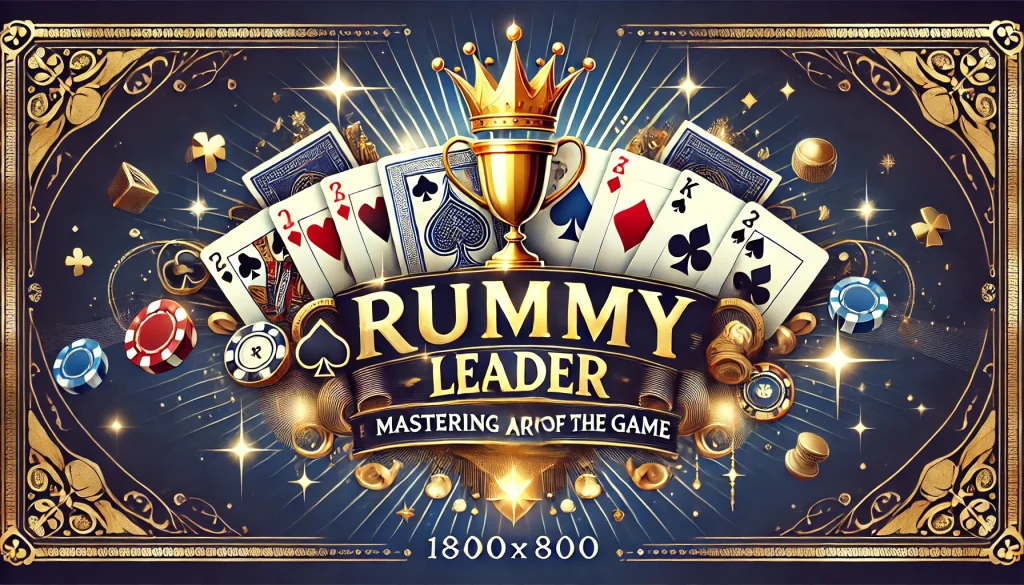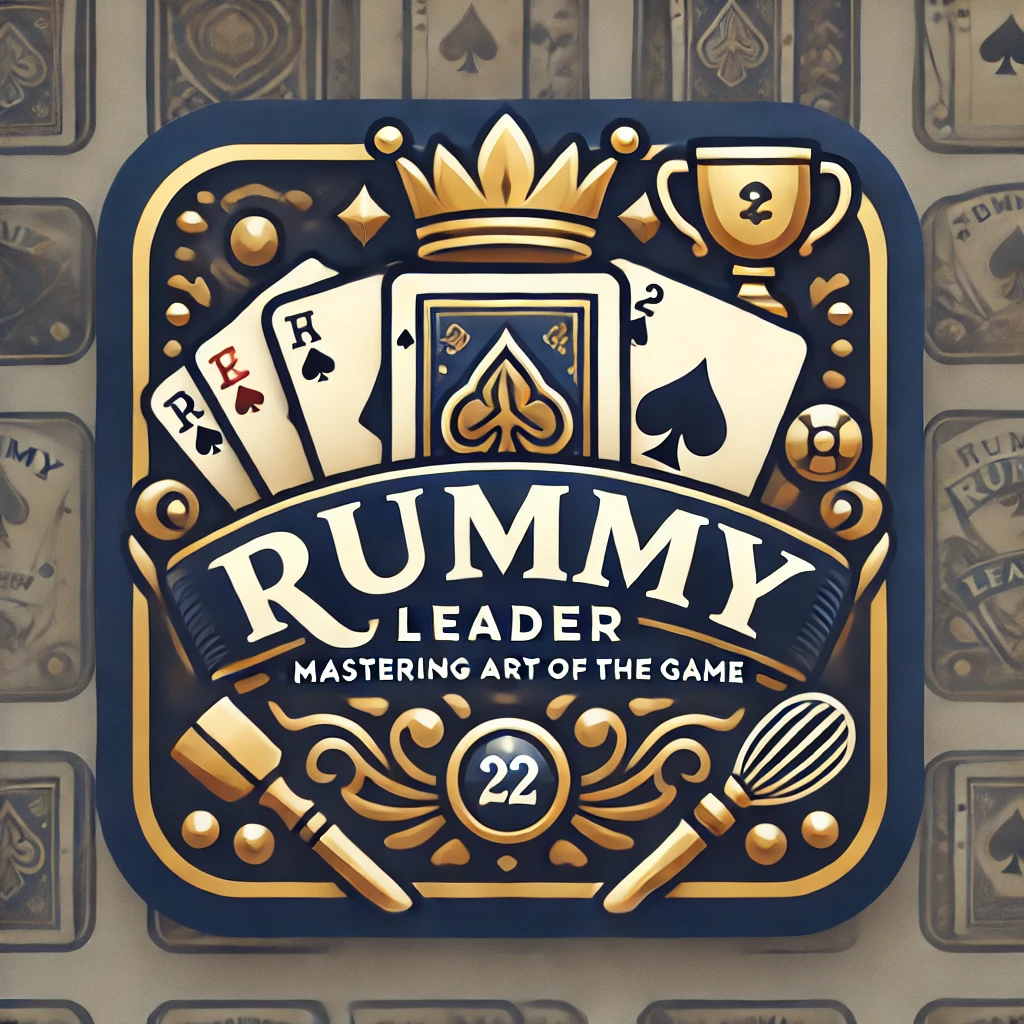Rummy Leader: Mastering the Art of the Game

The Complete Guide to Rummy The card game rummy date back to the early 1800s and has been a favorite among players for centuries. Although the game’s exact origins are a little unclear, it is generally accepted that Rummy developed from a number of earlier card games, such as the Spanish game “Conquian,” which is frequently mentioned as a forerunner. Played with a 40-card deck, Conquian established the foundation for many of the features present in contemporary Rummy. The game saw numerous adaptations as it traveled across borders, giving rise to the various iterations that are now known to us.
Rummy arrived in the United States by the late 1800s and quickly became very popular there, especially among families and social circles. Rummy developed into a wide variety of variants as it went along, each with its own distinct set of rules & gameplay elements. As an inexpensive source of entertainment during hard economic times, the game became a mainstay in American homes during the Great Depression.
Rummy’s reputation as a popular hobby was further cemented in the middle of the 20th century with the introduction of organized tournaments and the growth of commercial card decks. With innumerable variations like Gin Rummy, Indian Rummy, and Kalooki, each with unique tactics and challenges, rummy is played all over the world today. The game’s lengthy history demonstrates both its versatility and its capacity to unite people from different backgrounds and ages.
Recognizing the Main Goal of Rummy. Rummy is fundamentally a card game in which players must form sets and runs from a hand of cards. Becoming the first player to combine all of your cards into legitimate combinations—which can include runs (three or more consecutive cards of the same suit) or sets (three or four cards of the same rank)—is the main goal. The objective is to lower the total value of unmelded cards in each player’s hand as they alternately draw and discard cards. The fundamentals of gameplay and setup.
Each player is usually dealt a certain number of cards at the start of the game, usually seven or ten, while the remaining cards are arranged in a draw pile. Players can also put cards they no longer need in a discard pile. Comprehending the regulations is essential for efficient gameplay. Important Rummy Words and Techniques.
Players need to learn certain terms like “meld,” “lay off,” and “knocking,” which are essential to scoring and strategy. For example, “knocking” happens when a player discards a card to end their turn. This happens when the player thinks they have formed valid combinations.
When other players reveal their hands in response to this action, their scores are determined using the unmelded cards. Adjusting to Rummy Rules Changes. Different versions of the rules can also have a big impact on how the game is played; for instance, some versions let wild cards be used in place of any other card in a meld. To succeed in rummy, one must thus understand both the basic rules and any special variations.
Developing successful rummy strategies can greatly increase your winnings. One basic strategy is to closely observe the cards your opponents draw & discard. By making this observation, you can assess their possible hands and modify your approach accordingly. An opponent may be constructing a run in a suit if, for example, you observe that they are routinely discarding cards from that suit.
You may decide to discard cards that are less likely to assist them or keep the cards from that suit to prevent them from moving forward. This tactical aspect of observation gives you a competitive edge in addition to giving your gameplay more depth. Effective hand management is another crucial component of strategy. Players should watch what their opponents do and try to make melds as fast as they can.
Prioritizing the formation of runs over sets is a popular strategy because runs are typically more adaptable & can more readily accommodate extra cards. Players should also be aware of the cards they discard; it can be dangerous to discard valuable cards if opponents are almost ready to form their own melds. In addition to increasing your winning chances, balancing offense and defense in your strategy will also make the game more interesting & dynamic.
There are many different variations of rummy, each with its own twist on the traditional gameplay. Gin Rummy is a well-liked variation that places an emphasis on deft play and calculated discards. In Gin Rummy, players try to minimize deadwood, or the unmelded cards that are still in hand at the end of a round, while forming melds. This variation frequently has a quicker tempo and calls on players to consider their draws and discards carefully. Another well-known variation is Indian Rummy, which usually uses two decks of cards and permits more intricate melds, such as sets and sequences that can be created using wild cards.
Knowing these variations improves your ability to adapt as a player and increases your understanding of the game. Understanding the unique guidelines & tactics that apply to each variation is another aspect of mastering them. The gameplay of Kalooki Rummy is made more complex by the requirement that players form at least one set before they can lay off more melds.
You may have an advantage over opponents who are only familiar with one version of the game if you become familiar with these subtleties. You can also maintain your interest by trying out different Rummy games and interact with different player groups who might favor different variations. Practicing, being patient, and being open to learning from both wins and losses are all necessary for improving your rummy skills. Playing frequently against opponents of various skill levels is one useful strategy.
You will be forced by this exposure to modify your tactics and create fresh methods in light of your experiences. Think about reviewing your gameplay after every session as well; this will help you pinpoint areas that need work and strengthen tactics that have worked. Studying sophisticated tactics used by seasoned players or subject-matter experts is another helpful suggestion. There are a lot of resources on the internet, such as forums, videos, and articles about rummy strategies. By interacting with these resources, you can learn more sophisticated strategies that can improve your gameplay, like probability analysis or card counting.
You can also meet other rummy fans who share your enthusiasm by taking part in local or online tournaments, which can provide you with real-world experience in competitive settings. In rummy, observing opponents is essential to success. In a game of rummy, keeping an eye on your opponents is not just a passive activity; it is a crucial part of strategic gameplay that can greatly impact your outcome. By observing the cards they draw and discard, you can learn a lot about their possible hands & modify your approach appropriately.
It might be a sign that an opponent intends to form a run in a certain suit if, for example, they routinely pick up cards from that suit while discarding others. Using Opponent Insights to Inform Your Choices. Having this knowledge enables you to decide for yourself which cards to keep or discard. Also, you can gain more strategic advantages by keeping an eye on the patterns and actions of your rivals. It is possible to take advantage of certain patterns in the gameplay of certain players, such as their preference for particular meld types or their excessively aggressive discards.
Taking advantage of trends & spotting moves. Understanding these patterns will help you foresee their moves & successfully counter them. As you maneuver both your own and your opponents’ hands, this degree of observation not only improves your strategic approach but also gives the game a captivating psychological component. Developing Your Strategic Method. To improve your Rummy skills and obtain a competitive advantage, you should integrate opponent observation into your gameplay. Your chances of winning are increased by using this strategic approach, which also makes the game more entertaining and engaging.
For the best performance and decision-making in a game of rummy, it is essential to remain composed. Anxiety or frustration brought on by competitive pressure can impair judgment and prevent strategic thinking. Deep breathing exercises and mindfulness training are useful strategies for maintaining composure both before and during gameplay. You can reduce stress and improve focus on the game at hand by paying attention to your breathing or bringing yourself back to the present. Also, establishing reasonable goals for yourself can lessen pressure-related feelings while playing.
You can approach each game with a more laid-back attitude when you acknowledge that losses are a necessary component of learning. Put more effort into honing your skills and having fun with other players than you would into winning. This change in viewpoint not only makes the environment more pleasurable, but it also promotes fortitude in the face of difficulties. Beyond just becoming an expert player, there are many advantages to becoming a leader in rummy.
As a leader, you can encourage a sense of community among players by planning events or competitions that unite people around this cherished hobby. Along with strengthening your social ties, this role encourages healthy competition and lets you spread your love of rummy to others. Also, taking charge in rummy fosters important abilities like organization, communication, & strategic thinking—skills that are applicable to many facets of life outside of gaming. You can improve the gaming community and strengthen your own grasp of tactics by helping others play the game or coaching less seasoned players. In the end, taking on leadership roles in the world of rummy enhances your own experience as well as that of other players. Rummy is a complex game that is woven from strategy, history, observation, and community involvement; it is more than just a simple card game.
Knowing its nuances can help you enjoy & master this timeless classic more, regardless of your level of experience.
